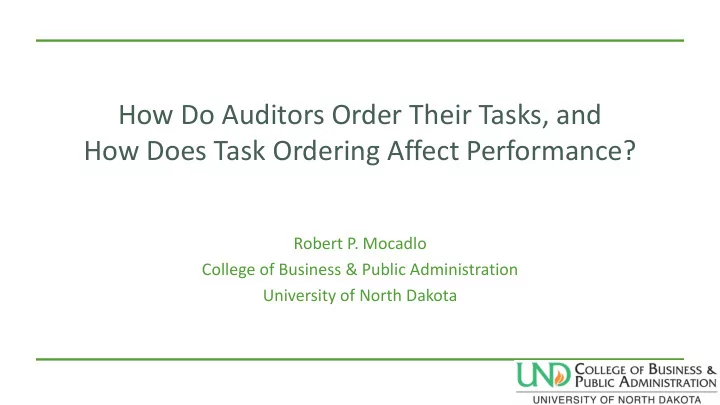

How Do Auditors Order Their Tasks, and How Does Task Ordering Affect Performance? Robert P. Mocadlo College of Business & Public Administration University of North Dakota
Background • Auditors need to meet deadlines and budgets • Archival evidence shows that reporting deadlines affect audit quality – López and Peters 2012, Bryant-Kutcher et al. 2013, Lambert et al. 2015, Glover et al. 2015 • How can auditors reduce time/effort while still completing all of their tasks? – Some audit tasks have more flexibility than others, so auditors could use this flexibility to ensure that all their tasks are completed 2
Task Performance Perfunctory Consummate performance performance Performance 0 Inefficient Incomplete Performance range The size of the performance range depends on the subjectivity of the task’s criteria or guidance
Objective Tasks • Performance range: narrow (or zero) • Low ability to decrease time/effort – Moving from the upper threshold to the lower threshold saves only a little (or no) time/effort 0 Performance Performance range 4
Subjective Tasks • Performance range: wide • High ability to decrease time/effort – Moving from the upper threshold to the lower threshold can save a lot of time/effort 0 Performance Performance range 5
Hypotheses 1 and 2 When auditors are assigned both an objective and subjective task: H1: They are more likely to choose to perform the objective task first regardless of time pressure H2: Performance will decrease more with time pressure for the subjective versus the objective task 6
Mitigating Effects of Criteria Subjectivity • What would cause auditors to prioritize subjective tasks? – Subjective accounts (more likely to require subjective audit tasks) tend to be riskier, which may lead to a higher assessed risk for these accounts in the planning phase of the audit – Increased importance of higher-risk tasks – Less likelihood of negative consequences from incomplete work on lower-risk tasks 7
Hypotheses 3 and 4 Regardless of time pressure, when auditors are assigned both an objective and subjective task: H3: Auditors will be more likely to perform the subjective task first if the assessed inherent risk for the account covered by the subjective task is high versus low H4: Performance will be higher on the subjective task relative to the objective task if the assessed inherent risk for the account covered by the subjective task is high versus low 8
Experimental Procedure • 113 auditor participants were given two tasks to complete – Objective task: matching sales invoices to supporting documentation – Subjective task: forming an expectation for a substantive analytical procedure related to workers’ compensation (adapted from Clor-Proell & Maines 2014) • Both tasks needed to be completed within an overall time limit • Auditors chose which task to perform first, worked on that task, then spent any remaining time on the second task 9
Independent Variables • Task Type (within-participants) – Objective and subjective • Time Pressure (between-participants) – In both conditions, participants were told that each task should take 10 minutes (20 minutes total) – Low : Participants had 25 minutes to complete both tasks – High : Participants had 15 minutes to complete both tasks • Subjective Task Risk (nested, between-participants) – Low vs. High (provided in the background) – Objective task risk is always low 10
Dependent Variables • First Task Chosen (objective or subjective) • Performance – Objective task: number of seeded errors caught (out of three) – Subjective task: level of disaggregation of data used to form expectation (three possible levels) 11
Results for H1 and H3 (First Task Chosen) • 67 of 113 participants (59%) performed the objective task first – Binomial probability test: p = 0.03 Logistic Regression for First Task Chosen Two-tailed χ 2 df p-value Constant 1 0.98 0.323 Time Pressure 1 3.64 0.056 Task Presentation Order 1 1.93 0.165 Time Pressure × Task Presentation Order 1 0.76 3.850 Subjective Task Risk 1 6.27 0.012 Time Pressure × Subjective Task Risk 1 9.91 0.002 Task Presentation Order × Subjective Task Risk 1 0.71 0.399 Time Pressure × Task Presentation Order × Subjective Task Risk 1 2.94 0.086 10/17/2016 12
Results for H1 and H3 (First Task Chosen) • Under High Time Pressure – First Task Chosen is dependent on Subjective Task Risk (Fisher’s exact test = 0.021) – When Subjective Task Risk is low (e.g. the inherent risk is the same across both tasks): • 22 of 30 participants (73%) performed the objective task first • Supports H1 – When Subjective Task Risk is high (e.g. the inherent risk is higher for the subjective task): • 14 of 33 participants (42%) performed the objective task first • Supports H3 13
Results for H1 and H3 (First Task Chosen) • Under Low Time Pressure – No significant relationship between First Task Chosen and Subjective Task Risk (p = 0.150) • Therefore, H1 and H3 are conditionally supported (when Time Pressure is High) 10/17/2016 14
Results for H2 and H4 (Performance) H2: Task Type × Time 3 Pressure interaction when Objective Task 2.5 performed first (p = 0.002) 2 Performance 1.5 H2: Task Type × Time Pressure interaction 1 when Subjective Task performed first .5 (p = 0.138) 0 Low TP High TP Low TP High TP H4: No effect of Objective Task Performed First Subjective Task Performed First Subjective Task Risk (smallest p = 0.389) Objective Task Subjective Task 15
Supplemental Analyses • Alternative specifications for robustness • Reduced observations based on manipulation check failures • Time spent on tasks • Likelihood of participants being able to complete both tasks • Effect of task difficulty 10/17/2016 16
Summary and Contribution • Auditors’ task ordering matters! • If subjective tasks are necessary to audit subjective accounts, auditors may be taking on more risk than they realize • Standard-setters, regulators, and audit firms should consider how the objective or subjective language in their guidance may interact with auditors’ incentives 17
Thank you! 18
Recommend
More recommend